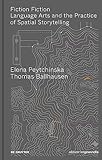Fiction Fiction : Language Arts and the Practice of Spatial Storytelling / Elena Peytchinska, Thomas Ballhausen.
Material type: TextSeries: Edition AngewandtePublisher: Berlin ; Boston : De Gruyter, [2023]Copyright date: ©2023Description: 1 online resource (320 p.)Content type:
TextSeries: Edition AngewandtePublisher: Berlin ; Boston : De Gruyter, [2023]Copyright date: ©2023Description: 1 online resource (320 p.)Content type: - 9783111251363
- 9783111251998
- 709.2
- online - DeGruyter
- Issued also in print.
| Item type | Current library | Call number | URL | Status | Notes | Barcode | |
|---|---|---|---|---|---|---|---|
 eBook
eBook
|
Biblioteca "Angelicum" Pont. Univ. S.Tommaso d'Aquino Nuvola online | online - DeGruyter (Browse shelf(Opens below)) | Online access | Not for loan (Accesso limitato) | Accesso per gli utenti autorizzati / Access for authorized users | (dgr)9783111251998 |
Frontmatter -- Table of Contents -- Das Ich verschwindet im Augapfel -- The I Disappears in the Eyeball -- FICTION FICTION -- Judy zieht in den Krieg -- Judy Goes to War -- Neue Lage -- New Position -- Pharmakon -- Pharmakon -- Schadcode -- Malicious Code -- Rhizophora oder Was aus ihrem Mund kam -- Rhizophora or What Came Out of Her Mouth -- Carbon Copy -- Carbon Copy -- Nach dem langen Schlaf -- After the Long Sleep -- Wir ölen den mechanischen Rücken der Schönheit -- We Oil the Mechanic Backside of Beauty -- After Callimachus -- Der Augapfel verschwindet im Ich. -- The Eye Disappears in the I. -- T H E R E -- Instead of closing it, the scar opens the wound. Poetics of Stigmata in Writing -- STAYING WITH THE QUESTION -- Footnotes -- Bibliography -- Imprint
restricted access online access with authorization star
http://purl.org/coar/access_right/c_16ec
Operative Fiction: Neue Erzählstrategien Mit Fiction Fiction entwickeln die bildende Künstlerin Elena Peytchinska und der Dichter Thomas Ballhausen ihre sprachkünstlerische Auseinandersetzung mit Raum und Sprache sowie mit der Verflechtung von Zeichnung und Literatur weiter. Standen in den Bänden FAUNA (2018) und FLORA (2020) Strategien der Annäherung zwischen den Künsten und den Naturwissenschaften unter sprachkünstlerischen Prämissen im Vordergrund, so folgt nun eine konsequente Befragung der Wechselbeziehung zwischen der science der fiction und der fiction der sciences. Fiction Fiction stellt im Zusammenspiel der Künste das relationale, praxisorientierte Modell einer sogenannten Operative Fiction vor, das dem vermeintlich undenkbaren Anderen nicht nur begegnet – sondern es als aktiven und notwendigen Teil in den Denk- und Schaffensprozess einbindet. Literatur und/als künstlerische Forschung, anknüpfend an FAUNA (2018) und FLORA (2020) Künstlerische Reflexion aktueller Philosophie und ihrer gesellschaftskritischen Kontexte; Zeichnungen und Sprachkunst als Buchobjekt Mit Beiträgen von Lucia D’Errico, Sabina Holzer, Elisabeth Schäfer und Ferdinand Schmatz
Operative fiction: New narrative strategies With Fiction Fiction, visual artist Elena Peytchinska and poet Thomas Ballhausen are continuing their linguistic/artistic exploration of space and language, as well as with the intertwining of drawing and literature. While their previous works FAUNA (2018) and FLORA (2020) focused on strategies of rapprochement between the arts and the sciences based on linguistic-artistic premises, their latest work interrogates the relationship between the science of fiction and the fiction of science. Fiction Fiction presents a relational, practice-oriented model of operative fiction, which not only encounters the supposedly unthinkable other but integrates it as an active and necessary part of thought and creative processes. Literature and/as artistic research, following on from FAUNA (2018) and FLORA (2020) Artistic reflections on contemporary philosophy and its sociocritical contexts With contributions by Lucia D’Errico, Sabina Holzer, Elisabeth Schäfer, and Ferdinand Schmatz
Issued also in print.
Mode of access: Internet via World Wide Web.
In English.
Description based on online resource; title from PDF title page (publisher's Web site, viewed 26. Apr 2024)


